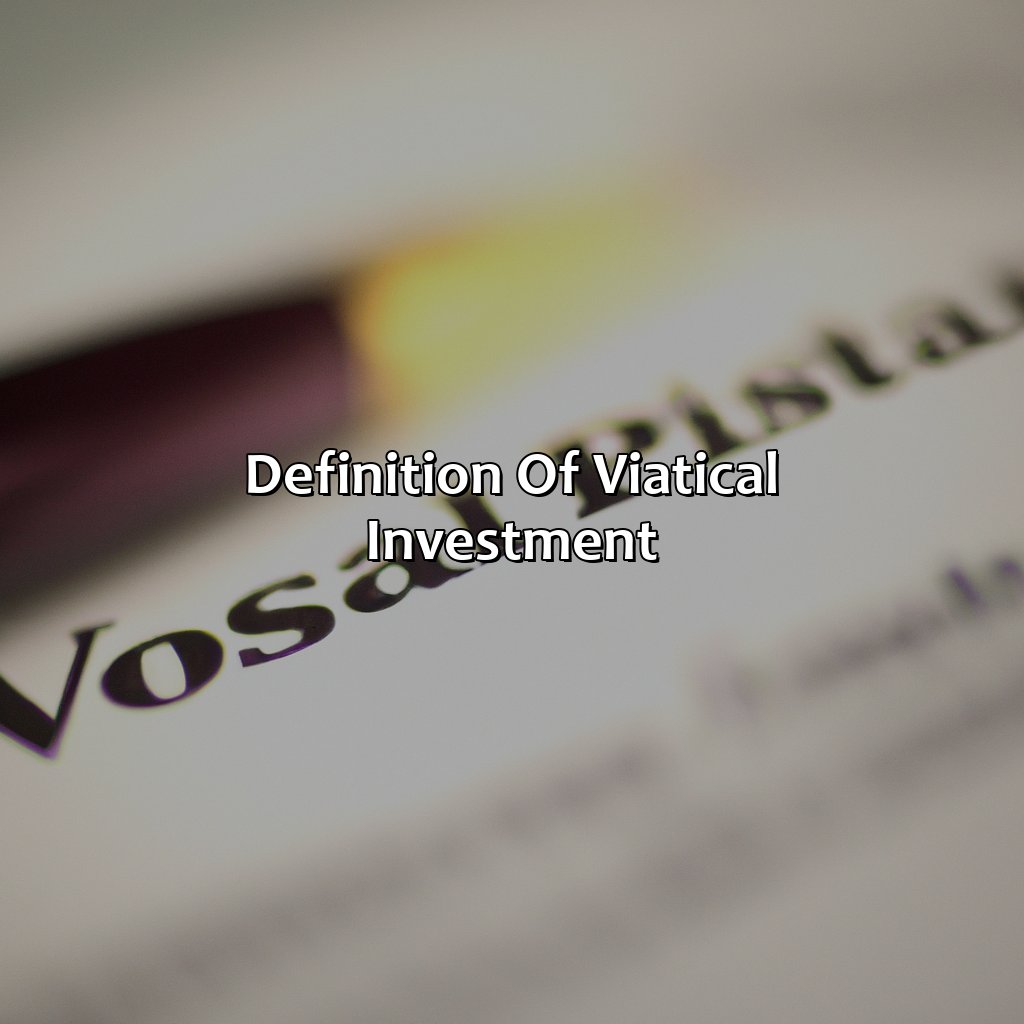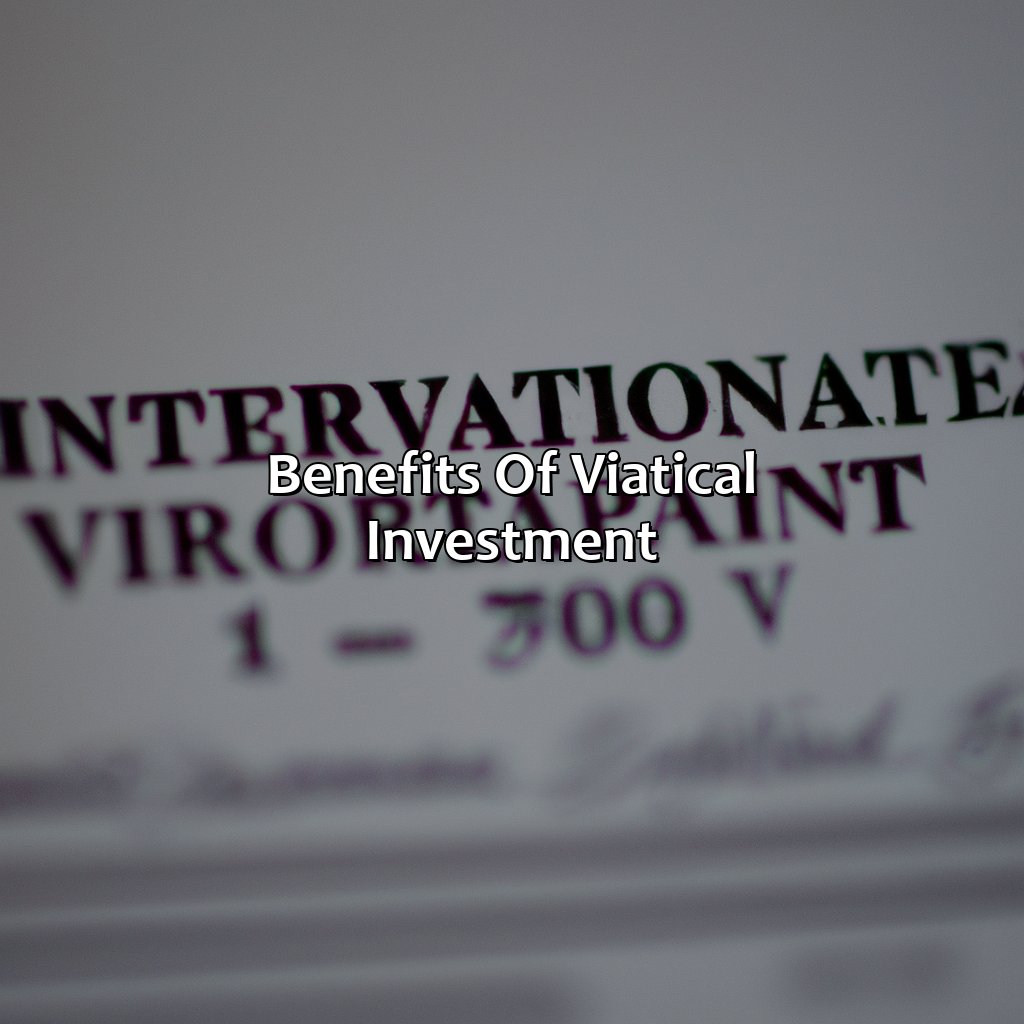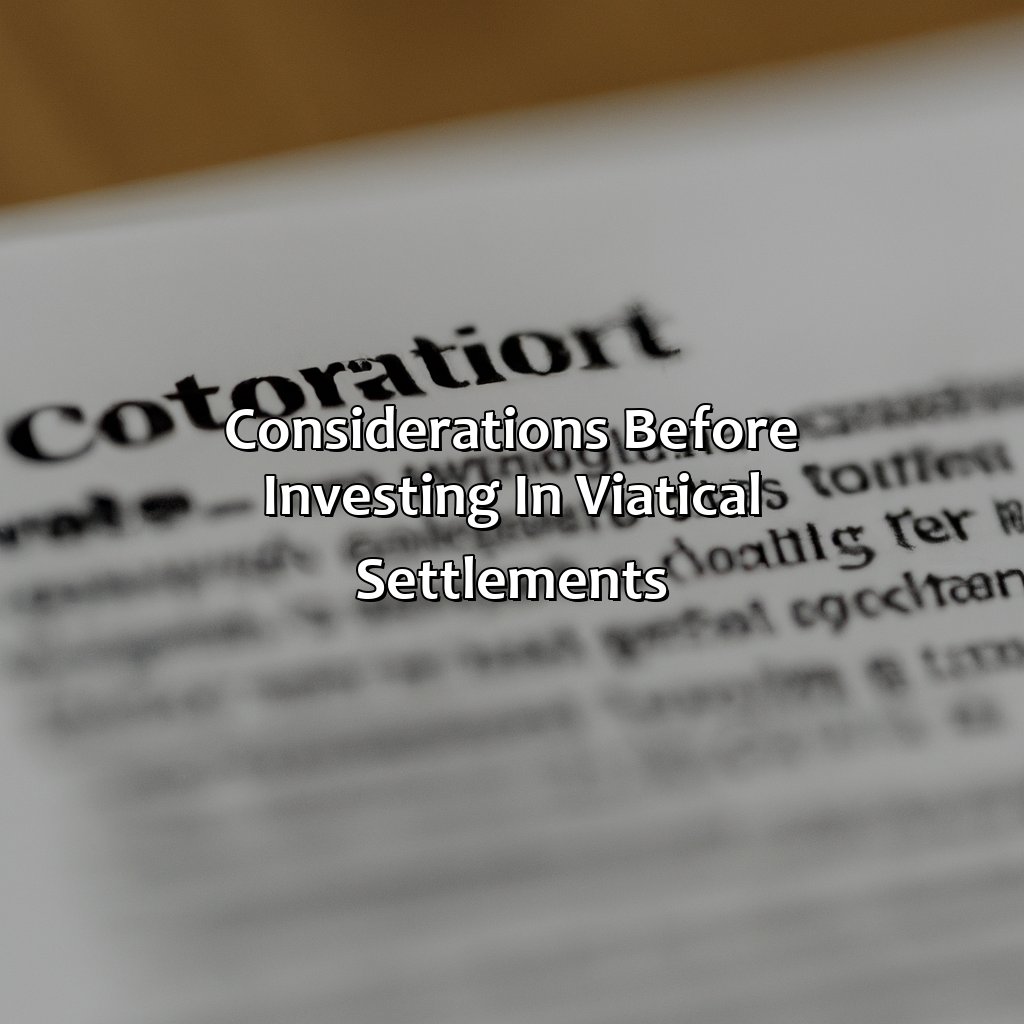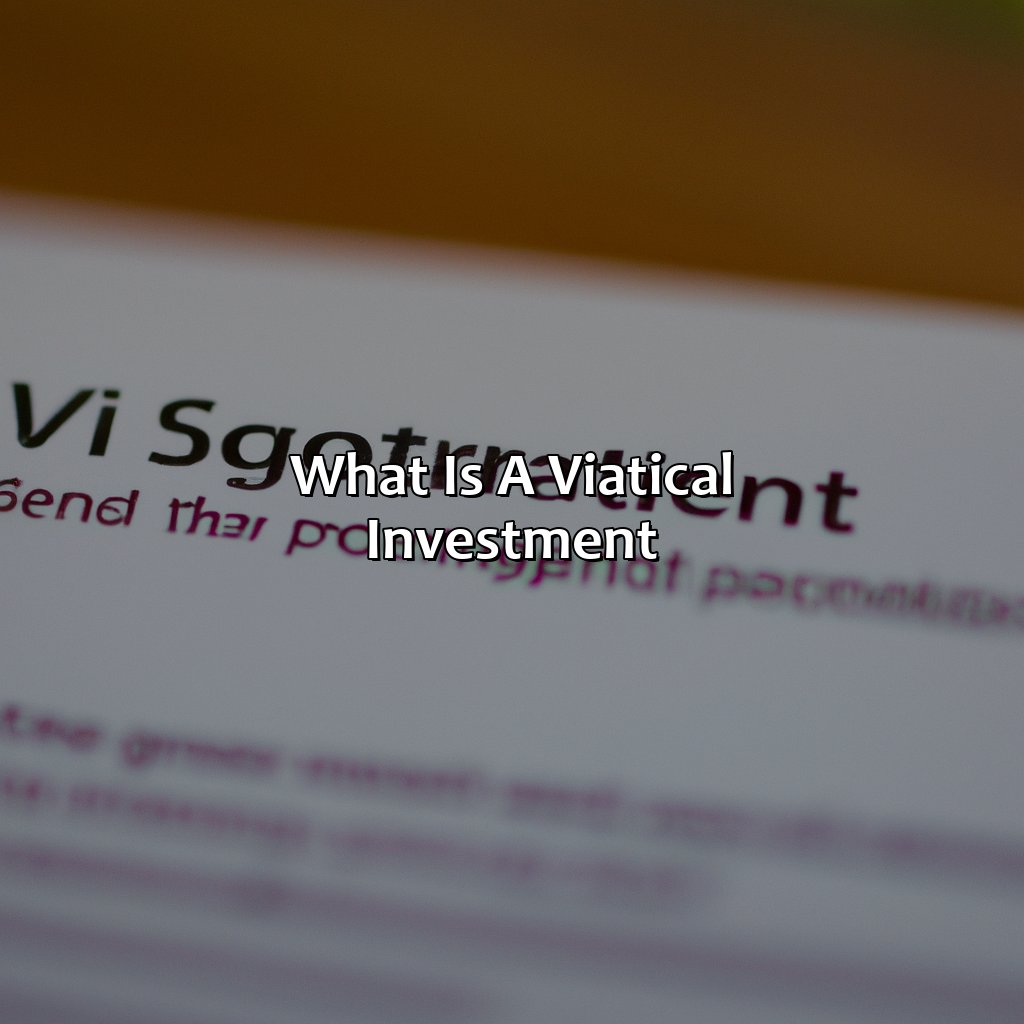What Is A Viatical Investment?
Key Takeaway:
- Viatical investments involve purchasing the life insurance policies of individuals who are terminally ill, with the aim of receiving a payout when they pass away. This investment vehicle offers a unique way to invest in the life insurance market while providing financial support to those in need.
- The benefits of viatical investments include potential high returns on investment, tax benefits, and lower investment risk due to the predictable nature of payouts. Additionally, this type of investment can provide a sense of personal satisfaction from helping individuals facing terminal illnesses.
- Before investing in viatical settlements, it is important to evaluate the provider, assess the risks involved, and closely review all legal documentation. Potential investors should also consider their personal values and level of comfort with investing in a market that involves the imminent passing of individuals.
Ever wondered how you can make money from life insurance policies? You’re in luck, as viatical investments can provide a lucrative and tax-free income. Learn how to get started with this essential guide.
Definition of Viatical Investment
Viatical investment refers to the purchase of life insurance policies from those with terminal illnesses, wherein the investor or buyer pays a lump sum amount to the policyholder, in exchange for becoming the policy’s beneficiary. This provides immediate cash to the policyholder, while the investor takes control of the policy and its payouts generated upon the death of the policyholder. However, this investment holds risks as the policyholder may outlive the estimated timeline, and the investment’s return may not be realized. It is important to conduct thorough research before investing.
Viatical investment has gained interest from investors due to the potential high returns, as death payouts from life insurance policies can be high. However, an investor needs to be aware of the terms and conditions of the life insurance policy and consider the risks associated with the investment. For instance, a policyholder’s health status may not be accurately assessed, leading to a longer lifespan than estimated, and the investor may not realize the expected returns. Moreover, there may be tax implications associated with viatical investment, making it important to consult with a financial advisor.
While viatical investment may seem like a straightforward investment, it requires a level of understanding of life insurance policies and the industry. Additionally, it is crucial for investors to conduct due diligence and invest in policies that have been accurately evaluated and have a proven record of providing returns to investors.
An individual was diagnosed with terminal cancer and had trouble paying medical bills, living expenses and leaving an inheritance for his children. He decided to sell his life insurance policy to a viatical settlement firm that paid him a lump sum amount. This helped him pay his bills and leave an inheritance for his loved ones, while the viatical settlement firm received the payouts upon the policyholder’s death. This story showcases the benefits of viatical investment for policyholders in need of immediate cash and investors seeking potential high returns.

Image credits: retiregenz.com by David Woodhock
Benefits of Viatical Investment
Viatical investment is a lucrative investment option where the investor purchases a life insurance policy from a terminally ill policyholder. The investor pays the premiums and receives the benefits upon the policyholder’s passing. Here are some advantages of this investment:
- Diversification: Viatical investment provides investors with a unique opportunity to diversify their portfolio with low correlation to the traditional stock market or real estate investments.
- High Returns: The return on investment is typically higher than the traditional investment options, making it an attractive choice for those seeking higher returns.
- Tax Benefits: The payouts received from viatical investment are usually tax-free, making it a tax-efficient investment option.
Additionally, investors can receive monthly payouts and can choose to sell their investment to other interested parties.
It is worth noting that the success of a viatical investment depends on the overall health of the policyholder and other factors such as premium amount, policy value, and the investor’s experience.
According to a study by the Viatical and Life Settlements Association of America, viatical settlement payouts have averaged between 60% and 80% of face value, making it a reasonable investment option for those seeking higher returns while helping those in need.

Image credits: retiregenz.com by James Duncun
Considerations before Investing in Viatical Settlements
In deciding to invest in a viatical settlement, several important factors must be considered. Firstly, the investor should understand the life insurance policy terms of the individual whose life expectancy is being purchased, including the specific medical condition and prognosis. This information is essential to assess the risk associated with the investment. Secondly, the investor should be aware of any state regulations regarding viatical investments, which vary widely across the US. Other considerations include the investor’s risk tolerance, the estimated time horizon of the investment, and the level of liquidity required.
It is crucial to ensure that the viatical life settlement provider is licensed in the state where the policy is issued. The provider should also possess a good reputation and experience in the industry. Investors must also evaluate the commission and fees charged to determine the profitability of their investment.
To avoid fraud, investors need to verify that the life insurance policyholder has provided consent for the policy sale. Scammers may misrepresent medical or life expectancy information, so it is necessary to obtain an independent evaluation of the policyholder’s medical condition from a qualified professional. These due diligence practices must be maintained throughout the investment term.
A cautionary tale of a viatical investment gone wrong involved a scammer who forged medical documents to misrepresent the life expectancy of the policyholder. Investors lost a considerable sum of money due to the fraudulent activity. This serves as a reminder of the importance of thorough research and careful review of all investment opportunities in the viatical settlement industry.

Image credits: retiregenz.com by Harry Duncun
Some Facts About Viatical Investments:
- ✅ A viatical investment involves the sale of life insurance policies by policyholders to investors for a percentage of the payout. (Source: Investopedia)
- ✅ The viatical industry emerged in the 1980s during the AIDS epidemic, as individuals with terminal illnesses sought ways to secure funds. (Source: The Balance)
- ✅ Viatical investments are not regulated by the SEC, and investors should be cautious of potential scams and frauds before investing. (Source: Forbes)
- ✅ Viatical investments may offer higher returns than traditional investments, but they carry higher risks and may not be suitable for everyone. (Source: MarketWatch)
- ✅ Viatical settlements have tax implications, and investors should consider consulting a financial advisor before investing. (Source: Nolo)
FAQs about What Is A Viatical Investment?
What is a viatical investment?
A viatical investment is a type of investment in which an individual purchases a life insurance policy from someone who is terminally ill or has a life threatening illness. The investor becomes the beneficiary of the policy and receives the death benefit upon the policyholder’s death.
How does a viatical investment work?
A viatical investment works by an investor buying a life insurance policy from a policyholder who is terminally ill or has a life threatening illness. The investor then assumes the responsibility of paying the premiums and becomes the beneficiary of the policy. Once the policyholder passes away, the investor receives the death benefit from the life insurance policy.
What are the benefits of a viatical investment?
The benefits of a viatical investment include potentially earning a high rate of return, having a predictable investment timeline, and possibly receiving tax advantages. Additionally, investing in a viatical settlement can provide an opportunity to help someone who is facing a serious health condition.
What are the risks associated with a viatical investment?
The risks associated with a viatical investment include the potential for the policyholder to live longer than expected, reducing the return on investment. Additionally, there is the risk of the policyholder’s medical condition being misrepresented, which can lead to legal and financial complications.
How can I invest in a viatical settlement?
To invest in a viatical settlement, you can work with a licensed viatical settlement provider who will identify potential investment opportunities and facilitate the purchase of a life insurance policy from a terminally ill or seriously ill policyholder. It is important to do thorough research and work with a reputable provider in this field.
Is a viatical investment right for me?
A viatical investment may be appropriate for investors who are comfortable with the risks associated with these types of investments and who have a desire to help someone facing a serious illness. It is important to carefully consider all aspects of the investment before making a decision, and to seek professional advice from a licensed investment advisor.


